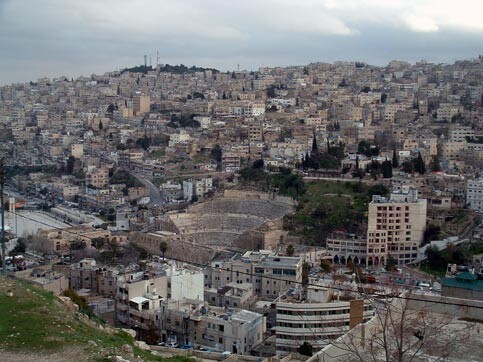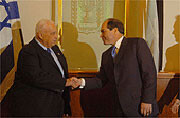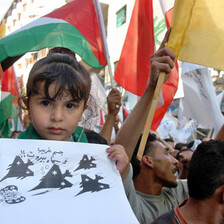The Electronic Intifada 23 March 2005

Downtown Amman and the Roman Amphitheatre as seen from the Citadel. Photo: Ali Abunimah
In recent weeks, Jordan has been embroiled in crises with its neighbors Iraq and Syria and has been subjected to harsh regional criticism for the initiative it launched to amend the Arab League peace initiative towards Israel. In over forty years as a Jordanian diplomat I witnessed many occasions when Jordan’s positions were subject to attack. It was my job to explain these positions and defend them when they were distorted. In order to understand how we got here, and see how we can restore the good relations and reputation that Jordan should enjoy, we need to make an objective assessment of recent events and actions, including missteps by Jordan’s diplomats.
Iraq has accused Jordan of supporting terrorism, sparking a crisis that resulted in the withdrawal of envoys. Of all accusations that could ever be made against Jordan, support for any form of violence or terror is the very last. Iraqis have been enraged that the suicide bomber who killed over one hundred Iraqis in Hilla was apparently Jordanian. Even if that is the case, it must be self-evident to anyone who knows Jordan and its historic stance that neither the Jordanian government nor the Jordanian people would condone such a heinous crime by any individual.
Damascus was irritated because Jordan’s Foreign Minister Hani Mulki added his voice to the many calling on Syria to implement Security Council Resolution 1559 which calls on foreign forces to leave Lebanon. Syria might not have been so upset had this call been placed in the proper context by simultaneously and specifically demanding the implementation of UN resolutions under which Israel must end its occupation and colonization of Syrian and Palestinian territory. At a time when Syria feels threatened, Jordan should play a balancing role and insist that all UN Resolutions be respected without double standards. The perception, which it cannot have been the government’s intention to project, was that Jordan was siding against Syria when it already felt besieged.
Into this already poisoned atmosphere came reports in the run up to the Arab summit in Algiers that Jordan was pushing for a new approach to the Arab-Israeli conflict. Jordan was said to be proposing to alter the Arab initiative launched at the 2002 Beirut summit. The most alarming element of the new version, supposedly, was that the Arab states would “simplify” the initiative by offering Israel full peace and normalization without waiting for Israel to withdraw from any occupied territory.
The hostile reaction these reports produced from governments and media before the summit was entirely predictable given the high levels of anger at Israel’s unending atrocities and continued territorial expansion, and Jordan went into the summit already on the defensive. What was needed to rescue the situation was skilled, active diplomacy and that, unfortunately, is where Jordan’s diplomacy faltered.

Jordanian Foreign Minister Hani Mulki speaks to reports in Algiers on 21 March 2005.
Brevity, however, does not seem to be the problem. Since the 1967 war, an international consensus has been painstakingly built around a solution based on just three words: land for peace. Israel supposedly accepted this formula at the 1991 Madrid conference, but Israel’s main response has been to seize more land and build more settlements. UN Security Council Resolution 242, which articulated the land-for-peace formula, itself covers barely half a page. Are we now to believe that the 38 years since it was passed have been insufficient for Israel to read it? And what about the Road Map? That document, proposed by the Quartet and accepted by the Palestinians as well as Jordan, covers just a few pages and refers explicitly to the Arab initiative of 2002.
Yet Israel’s response was to lengthen the document — adding 100 “reservations” (later reduced to 14) — which gut it of its content. Israel even objected to any mention of the Arab intiative, which means that it is not seeking amendments to the initiative but to escape it all together. If we take positions that lack all credibility, we will be accused of pretending to be fools in order to hide malicious schemes, and our country does not deserve that.

Israeli Prime Minister Ariel Sharon receives Jordan’s Foreign Minister Hani Mulki in Occupied Jerusalem on 6 March 2005
“After lengthy negotiations,” Ha’aretz reported on 22 March, “it was decided that the resolution will state that normalization of ties with Israel will not take place before Israel withdraws to the 1967 borders and a Palestinian state is established.”
Mulki, in reaction to his failure to persuade fellow ministers to support his line, reportedly said, “Arabs cannot read history well and they are led by their emotion, not by reason.” If that is the case, one must wonder what should be the reasonable, non-emotional response to Israel’s announcement, coinciding with the summit that it plans to build another 3,500 homes in the West Bank settlement of Ma’ale Adumim? Was this an Israeli effort to support moderates at the Arab summit? More likely, Israel simply does not care because it is not building settlements just because there is no Omani or Moroccan Ambassador in Tel Aviv.
Jordan has a central role to play in bringing peace to this region and has led by example. It has always shone by showing consistency, moderation and an unwavering commitment to a just and durable peace. When Jordan forcefully and correctly argued against Israel’s apartheid wall in the occupied territories at the International Court of Justice in the Hague last year, it deservedly gained respect and influence. We need to maintain a correct, dignified, and courageous pursuit of those principles and act as a reference for the region.
Nor, when we have heard so many painful and unfair words said about our country in recent weeks, should we hide our heads in the sand. The ultimate safety of our country and its interests should take priority over any niceties that might prevent us pointing out when our officials so badly stumble. There is no doubt that Jordan deserves better.
The writer is former Jordanian ambassador to Italy, Portugal, Belgium, Holland, Luxembourg, and the United Nations in New York, and was a member of the Jordanian-Palestinian joint delegation at the Washington Peace talks in 1991-92. A version of this article first appeared in The Jordan Times.





